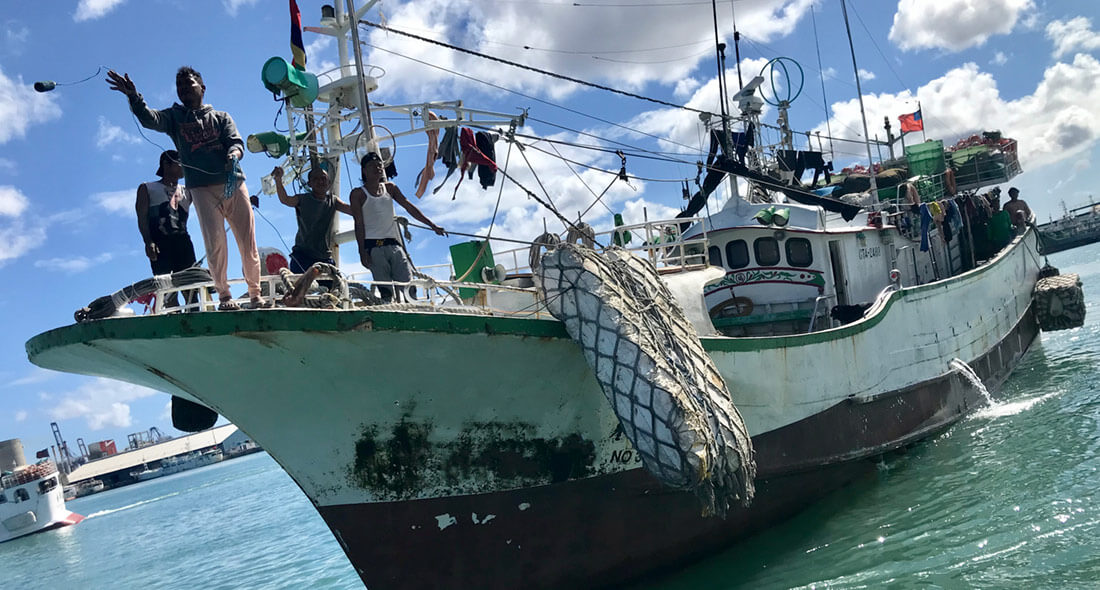The UCI’s Marine and Environmental Speaker Series welcomed Angela Abolhassani, postdoctoral fellow for the Ocean Nexus Center at the University of Washington, to deliver the virtual lecture, “The Empirics of Equity: Examining Tuna Management Decisions in the Western and Central Pacific and Indian Oceans,” on Wednesday, Sept. 22.
Tony Macdonald, Director Of The Urban Coast Institute, addressed listeners and gave his perspective on the cross section of climate and equity.
“I think we are in kind of a critical time, and there’s some really fascinating work going on right now, thinking about not only climate and the upcoming convention but how that impacts every aspect of our lives,” Macdonald said. “I’m really recog-nizing, perhaps in a way we never have before, that there are issues of inclusion, diversity, and equity that we really have completely put on the back burner and need now to be front and center on the discussion, not an afterthought.”
There’s many issues recognizing how incredibly important and dynamic the ocean is in relevance to the whole climate, Macdonald explained.
Abolhassani completed her Ph.D. last year with the University of Tasmania, Australia, where her research was an interdisciplinary project between the University’s law school and the Institute for Marine and Antarctic Studies.
Her focus on equity developed naturally from early experiences working in fisheries policy, Abolhassani explained. She spent time interning and touring with multiple intergovernmental organizations that negotiate and adopt policy on transboundary fisheries, including the secretariats of the Food and Agriculture Organization, the United Nations, the Western and Central Pacific Fisheries Commission, and the Commission for The Conservation of Antarctic Marine Living Resources.
“My experiences taught me [that] there seemed to be two very different conversations happening in the academic literature and within the organizations themselves,” Abolhassani said. “While the literature focused mainly on themes of sustain-ability and effective fisheries management, it seems that these organizations and their members were much more focused and preoccupied with themes of equity and the distribution of economic benefits from fisheries’ resources.”
Abolhassani was surprised when she attended meetings and discovered dramatic stages for fierce debates over control of fisheries’ resources, she explained. This disconnect is what led Abolhassani to her Ph.D. work, which addresses a lack of empirical research on how countries talk about equity in the specific context of transboundary and environmental regimes. Her work touches on the results of the negotiated outcomes for developing countries which may be dependent on transboundary resources and have particular vulnerabilities in regards to environmental problems.
The largest concentration of tuna fish stocks are in the equatorial band of the world’s oceans, Abolhassani explained. Tuna embark on the longest migrations of any fish species in the world, crossing national and international boundaries established under international law.
“Tuna are considered a transboundary resource and like other transboundary resources such
as water, oil and forests, they are managed through the establishment of resource-sharing treaty regimes between countries,” Abolhassani said. “Unlike these other resources, tuna are a living, mobile resource, and they’re pursued by an increasing number of highly efficient and very large industrial fishing vessels.”
Countries have devised regimes to conserve and manage tuna stocks, articulated in a series of authoritative legal instruments implemented by the five tuna regional fisheries management organizations: the Commission for the Conservation of Southern Bluefin Tuna, the International Commission for the Conservation of Atlantic Tunas, the Inter-American Tropical Tuna Commission, the Western and Central Pacific Fisheries Commission, and the Indian Ocean Tuna Commission.
The fisheries industry in general is rife with acronyms of large organizations, Abolhassani explained, but primary focus of the presentation was spent on the the Western and Central Pacific Fisheries Commission and the Indian Ocean Tuna Commission.
“These [organizations] derive their management authority from treaty law, agreed to by member countries, and then [they] assemble these members every year to adopt regulatory measures towards tuna fishing activities in their regions,” Abolhassani said.
Tensions often arise due to conflicting interests between developing coastal countries, Abolhassani explained. “On one hand, [coastal countries] have resource rights to tuna stocks in areas within national jurisdiction, and industrial fishing countries which flag and subsidize vessels that harvest tuna stocks in areas both within and outside national jurisdiction, are at the core of these tensions [which] are often questions of equity.”
“Let me preface by saying that equity is a difficult concept to study,” Abolhassani said. “I believe this is because equity is associated with ethical questions about human institutions and their effects. It’s also related to managing human behavior rather than the environment, or fish stocks themselves.”
When we think about equity in the context of the five tuna regional fisheries management organizations, we are thinking about the ethical dimensions of environmental protection and natural resource management, Abolhassani explained.
“As I’ve mentioned, my Ph.D. was through a law school, so I looked to legal understandings of equity to provide me with a practical approach to studying it in the context of tuna management from an international legal perspective,” Abolhassani said. “Equity is defined against the fundamental concept of sovereign equality, which refers to reciprocal legal relations between countries and their identical treatment regardless of size, wealth, or any other factor.”
In contrast, equity is defined by the need for unequal treatment between countries in cases where equal treatment would produce an unjust result, Abolhassani explained.
“Under this definition of equity and its connection to the concept of justice among countries, there are judicial, generational, and legislative forms of equity in international law.”



